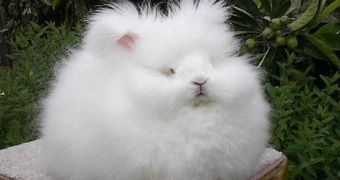It may be true that most of PETA's campaigns against meat consumption and animal cruelty fail to get loads of media attention, but the organization's undercover investigation into the horror of the angora wool industry made headlines, and convinced quite a lot of brands to quit selling products made from this material.
Recent news on the topic says that, following in the footsteps of Zara, Marks and Spencer, H&M, Esprit, New Look and several other companies of the kind, retail giant John Lewis has announced plans to stop marketing clothes and other products made from angora wool.
Unlike other companies that have settled for suspending the sale of angora products until investigations prove that their suppliers are not guilty of animal cruelty, John Lewis has taken things one step further and has said that, regardless of what its suppliers might be up to, an angora ban is to be instituted in all its stores across Great Britain.
“As part of our ongoing program of supply chain management, we recently contacted suppliers about concerns raised by customers around the sourcing of angora wool.”
“While we found no evidence of unacceptable animal welfare practices, nevertheless we have decided to no longer include angora in future John Lewis own brand or branded products,” a spokesperson for the company told the press in a recent interview, as cited by The Telegraph.
What's interesting is that, according to Daily Mail, brands need not necessarily quit selling angora products altogether in order to prove that they are committed to protecting animal rights. On the contrary, it would appear that there is a way to harvest this material in a humane and ethical fashion.
The publication details that angora rabbits have a very thick coat, easily noticeable in the picture next to this article, which needs to be groomed on a regular basis. Consequently, angora producers can always choose to only sell the wool that they collect from these animals while grooming them.
Granted, products made from angora fur collected in this humane way are a tad more expensive, but animal rights activists are sure to argue that it is well worth paying for.
“You can't compare what we do with the industrial angora market, or expect us to compete on price. There is simply no way to do angora humanely on a large scale,” says Ambika Conroy, the current owner of ethical angora label Ambika.
This angora producer has some 20 rabbits in her care, and clips their fur once every three months. Because she does not obtain all that much fur by doing what she does, the earmuffs, hats and leg warmers made from the wool she grooms off the 20 rabbits sell for about £116 (€140.6 / $190.4), £160 (€194 / $262.7), and £268 (€325 / $440), respectively.

 14 DAY TRIAL //
14 DAY TRIAL //